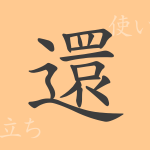The Japanese language has the power to delicately express emotions and scenes. The kanji “憾” (Kan) encapsulates our complex feelings in a single character. In this article, we will unveil the meaning and usage of “憾” (Kan), as well as the cultural resonance behind it. Dive deep into the world of “憾” (Kan) to stimulate your intellectual curiosity and explore its allure.
Origins of 憾 (Kan)
The kanji “憾” (Kan) is composed of “忄” (Rissinben), representing the heart, and “感” (Kan), meaning to feel or to think. From this combination, the meaning “to feel deeply in the heart” emerged, later evolving to express emotions such as regret or a nagging feeling. In ancient Chinese literature, this character was used to convey the subtle fluctuations of human emotions.
Meaning and Usage of 憾 (Kan)
“憾” (Kan) is a word that expresses feelings of regret or disappointment. It is used when ruing something or when things do not go as expected. While not commonly used in everyday conversation, it can be found in literature and formal contexts. Often used in its verb form “憾む” (Kanmu), it can also be expressed as “心残り” (Kokoronoko-ri – lingering regret) or “遺憾” (Ikan – regret).
Reading, Stroke Count, and Radical of 憾 (Kan)
The kanji “憾” (Kan) is rich in meaning, but its reading and structure also showcase the depth of the Japanese language.
- Reading: The on’yomi (Chinese reading) is “Kan”, and there is no special kun’yomi (Japanese reading).
- Stroke Count: It has a total of 21 strokes.
- Radical: The radical is “忄” (Rissinben), representing the heart.
Idioms, Phrases, and Proverbs Using 憾 (Kan) and Their Meanings
Idioms and phrases containing “憾” (Kan) are utilized to express deep feelings. Here are some examples:
- 遺憾の意 (Ikan-no-i): Meaning “regrettably,” it is used to describe outcomes that are contrary to expectations.
- 憾みなく (Ura-minaku): Meaning “without regret” or “without lingering feelings,” it is used to express a lack of regret.
- 遺憾ながら (Ikan-nagara): Also meaning “regrettably,” it is used when declining something or expressing disappointment.
Summary of 憾 (Kan)
The kanji “憾” (Kan) is a word well-suited to express the deep emotions lying within our hearts. From its origins, it is used in various idioms and phrases, conveying the richness of Japanese emotions. Understanding the meaning behind this character deepens our appreciation of the emotions and culture underlying the language.

























